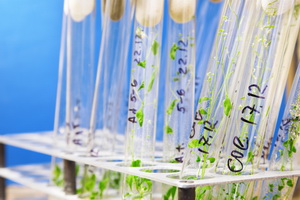
Study Reveals How Climate Change Alters Plant Growth
January 17, 2018| |
 Global warming has affected not only plant biodiversity, but also altered the way plants grow. A team of researchers at Martin Luther University Halle-Wittenberg (MLU) joined forces with the Leibniz Institute for Plant Biochemistry (IPB) to discover which molecular processes are involved in plant growth at high temperatures. This could help breed plants that adapt to global warming.
Global warming has affected not only plant biodiversity, but also altered the way plants grow. A team of researchers at Martin Luther University Halle-Wittenberg (MLU) joined forces with the Leibniz Institute for Plant Biochemistry (IPB) to discover which molecular processes are involved in plant growth at high temperatures. This could help breed plants that adapt to global warming.
Professor Marcel Quint, an agricultural scientist at MLU, explains that the correlation between temperature and plant growth at the macrolevel is relatively well understood, but there are still many open questions at the molecular level. Previous studies showed that the protein PIF4 directly controls plant growth, but this protein is also dependent on temperature. PIF4 is less active when it's cold, but at higher temperatures, PIF4 activates growth-promoting genes and the plant grows taller. Though this information is known to scientists, it had been unclear how the plant knows when to activate PIF4 and how much should be released.
This is precisely what the research group in Halle has now discovered. They investigated the growth behavior of Arabidopsis seedlings which normally form short stems at 20 degrees Celsius. In the lab, the scientists identified plants with a gene defect which still only formed short stems at 28 degrees. Then they searched for possible reasons for this lack in growth and discovered a hormone that activates the PIF4 gene at high temperatures, thus producing the protein. This reaction did not occur in the mutated plants. "We have now discovered the role of this special hormone in the signalling pathway and have found a mechanism through which the growth process is positively regulated at higher temperatures," Quint explains.
Read more about this research at the MLU website.
| |
Biotech Updates is a weekly newsletter of ISAAA, a not-for-profit organization. It is distributed for free to over 22,000 subscribers worldwide to inform them about the key developments in biosciences, especially in biotechnology. Your support will help us in our mission to feed the world with knowledge. You can help by donating as little as $10.
-
See more articles:
-
News from Around the World
- Prices of Food Decline in December 2017
- Northern Corn Leaf Blight Genes Now Identified
- US President Donald Trump Mentions Biotechnology at AFBF Convention
- NRGene Reports First-ever Food Potato Genomes
- SABC and ISCI Release "Cotton Bollworm Management Strategy" for India
- Space Age Plant Breeding Paves the Way for Future Crops
- Study Reveals How Climate Change Alters Plant Growth
-
Research Highlights
- Vietnamese Researchers Analyze Function of Arabidopsis ERF8 Expressed in E. coli
- Biofortification of Beta-carotene in Cassava Enhances Provitamin A Content and Shelf Life
- Generating RNA Virus Resistance in Plants by Harnessing the CRISPR Immune System
-
Beyond Crop Biotech
- Wearable Sensors to Measure Water Use in Plants
- Indigo Dye from Genetically Engineered Bacteria
-
Resources
- Trending News on Crop Biotech in 2017
-
Plant
- Development of Glutinous Rice via CRISPR-Cas9 Mutagenesis in Elite Rice Variety
- Researchers Study the Function of FRUCTOKINASE-LIKE PROTEIN 1 in Rice Using CRISPR-Cas9
-
Read the latest: - Biotech Updates (December 17, 2025)
- Gene Editing Supplement (December 17, 2025)
- Gene Drive Supplement (February 22, 2023)
-
Subscribe to BU: - Share
- Tweet
